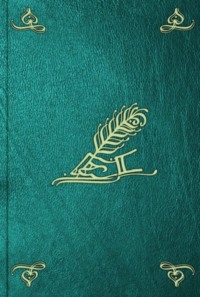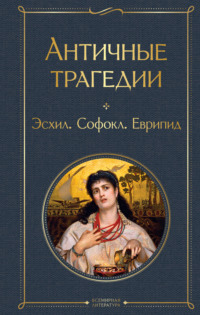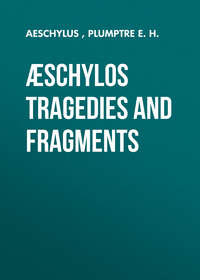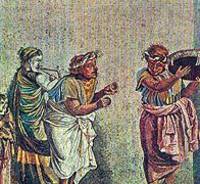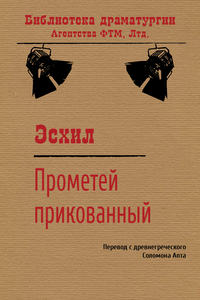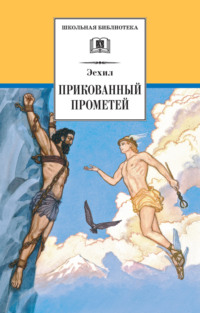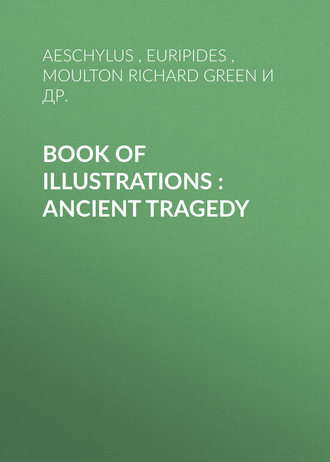 полная версия
полная версияBook of illustrations : Ancient Tragedy
Chanting in marching rhythm they rapidly descend the Orchestra staircase, form about the Altar and then proceed to
CHORAL SPELL (FOR ENTRY ODE)in four Strophes and Antistrophes.
Strophe I
O Mother who didst bear me, mother Night, A terror of the living and the dead, Hear me, oh hear! The son of Leto puts me to disgrace And robs me of my spoil, This crouching victim for a Mother's blood: And over him as slain, We raise this chant of madness, frenzy-working, The hymn the Erinnyes love, A spell upon the soul, a lyreless strain That withers up men's strength.Antistrophe I
This lot the all-pervading destiny Hath spun to hold its ground for evermore, That we should still attend On him on whom there rests the guilt of blood Of kin, shed causelessly, Till earth lie o'er him; nor shall death set free. And over him as slain, We raise this chant of madness, frenzy-working, The hymn the Erinnyes love, A spell upon the soul, a lyreless strain, That withers up men's strength. {328}Strophe II
Such lot was then assigned us at our birth: From us the Undying Ones must hold aloof: Nor is there one who shares The banquet-meal with us; In garments white I have nor part nor lot; My choice was made for overthrow of homes, Where home-bred slaughter works a loved one's death: Ha! hunting after him, Strong though he be, 'tis ours To wear the newness of his young blood down.Antistrophe II
Since 'tis our work another's task to take, The Gods indeed may bar the force of prayers Men offer unto me, But may not clash in strife; For Zeus doth cast us from his fellowship, "Blood-dropping, worthy of his utmost hate." For leaping down as from the topmost height, I on my victim bring The crushing force of feet, Limbs that o'erthrow e'en those that swiftly run, An Atè hard to bear. {350}Strophe III
And fame of men, though very lofty now Beneath the clear, bright sky, Below the earth grows dim and fades away Before the attack of us, the black-robed ones, And these our dancings wild, Which all men loathe and hate.Antistrophe III
Falling in frenzied guilt, he knows it not; So thick the blinding cloud That o'er him floats; and Rumour widely spread With many a sigh reports the dreary doom, A mist that o'er the house In gathering darkness broods. {358}Strophe IV
Fixed is the law, no lack of means find we; We work out all our will, We, the dread Powers, the registrars of crime, Whom mortals fail to soothe, Fulfilling tasks dishonoured, unrevered, Apart from all the Gods, In foul and sunless gloom, Driving o'er rough steep road both those that see, And those whose eyes are dark.Antistrophe IV
What mortal man then doth not bow in awe And fear before all this, Hearing from me the destined ordinance Assigned me by the Gods? This task of mine is one of ancient days; Nor meet I here with scorn, Though 'neath the earth I dwell, And live there in the darkness thick and dense, Where never sunbeam falls. {374}EPISODE IEnter in her Chariot [along the balcony of the permanent scene] Athene.
Athene has heard far off Orestes' cry, and has come in her swift chariot. What is this strange presence in her own city, and who is this suppliant? The Chorus, in parallel dialogue, explain who they are, and seek to enlist Athene against the matricide; but Athene answers she has only heard one side. Chorus rejoin that the adversary dares not rest his case on oath for oath [political allusion to procedure of ordinary Athenian Courts]; Athene thinks that a poor way of getting at truth, and as Chorus express confidence in her judgment she calls on Orestes; he details again all the rites of purification he has gone through, and how Apollo bade him do the deed. Athene pauses: Murder stirred by wrath [i. e., homicide as distinguished from murder, the special province of the Court of Areopagus] is too much for mortal or even herself to decide; but she hereby appoints jurors on oath [the special distinction of the Areopagus] as a perpetual institution for dealing with such cases. Let the parties prepare, she will return soon with the best of her citizens [observe, the Court was an Aristocratic Court] as Jurors. {467}
CHORAL INTERLUDEin four Strophes and Antistrophes.
Unless the right cause gains here there will be an outbreak of new laws, general recklessness, and woes of slain kindred with no Furies to avenge. Awe is good as watchman of the soul, and calm Wisdom gained by sorrow; it is not the lawless life that is to be praised, but from the soul's true health comes the fair fortune, loved of all mankind and aim of many a prayer. He who reveres not the High Altar of Justice, but dareth and transgresseth all, will, perforce, as time wears on, have to take in sail,
When trouble makes him hers, and each yard-arm Is shivered by the blast,and in vain he struggles mid the whirling waves, ever failing to weather round the perilous promontory till he is wrecked on the reefs of Vengeance. {535}
CHANGE OF SCENEto Mars' Hill. Enter Athene, followed by Herald and Twelve Citizens.
EXODUS, OR FINALEAthene bids the Herald sound a summons, for the whole city is to learn the laws she makes for all time to come. Apollo enters above. The Chorus challenging his right, Apollo declares himself Witness and Advocate for Orestes. {551}
The Proceedings from this part are exactly modelled on those of the Court of the Areopagus. The Chorus called on to open, cross-examine Orestes in stichomuthic dialogue, who admits the deed, and pleads justification that she slew his father. —Cho. rejoin she has been paid by death, Orestes still lives. Why, then, Orestes enquires, did they not pursue her while alive? Chorus rest on plea that hers was not kindred blood. On this Orestes joins issue and appeals to Apollo. He answers: Though the Jurors are on oath, yet Zeus gave the oracle, and he is mightier than an oath. —Cho. What, Zeus take a matricide's part? —Apollo details the base manner of Agamemnon's murder. —Cho. taunt Apollo that Zeus himself rose by imprisoning his father. —Apollo rejoins that imprisonment is remediable, but blood once spilt can never be brought back. —Cho. appeal to impossibility of restoring such a criminal to the house he has polluted. – Then Apollo puts forth the essence of his case (in a subtle plea which would delight the litigious Athenians): the mother is only the nurse, the father is the true parent; as proof here is Pallas sprung from a Father without any Mother; none can be shown born without Father. {650}
Both parties join issue, and then (amidst intense political excitement) Athene delivers the Inauguration Address of the Court of the Areopagus.
Athene. Hear ye my order, O ye Attic people,
In act to judge your first great murder-cause. And henceforth shall the host of Aegeus' race For ever own this council-hall of judges: And for this Ares' hill, the Amazons' seat And camp when they, enraged with Theseus, came In hostile march, and built as counterwork This citadel high-reared, a city new, And sacrificed to Ares, whence 'tis named As Ares' hill and fortress: in this, I say, The reverent awe its citizens shall own, And fear, awe's kindred, shall restrain from wrong By day, nor less by night, so long as they, The burghers, alter not themselves their laws: But if with drain of filth and tainted soil Clear river thou pollute, no drink thou'lt find. I give my counsel to you, citizens, To reverence and guard well that form of State Which is nor lawless, nor tyrannical, And not to cast all fear from out the city; For what man lives devoid of fear and just? But rightly shrinking, owning awe like this, Ye then would have a bulwark of your land, A safeguard for your city, such as none Boast or in Skythia's or in Pelops' clime. This council I establish pure from bribe, Reverend, and keen to act, for those that sleep An ever-watchful sentry of the land. {676}After a rapid stichomuthic interchange of promises and threats by the two parties the voting is proceeded with, Athene first giving her casting vote, in case of equality, to Orestes, as preferring the male cause. [This was a political allusion to the 'vote of Athene' or custom of the Areopagite Court to give the casting vole to the accused.] The votes are counted, found equal, and Athene declares Orestes acquitted. —Orestes, in a burst of gratitude, declares his Argive people shall always be firm friends with the people of Athens. [Political hit.] {747}
The Chorus breaking into Strophic Lyrics vow vengeance and long train of ills on the city for this, Athene (in Blank Verse) propitiating them, and pleading that the cause has been fairly tried. Moreover they would lose all the good things the city will do for them if friendly, offering them a house in its midst. Gradually the Chorus calm down, and having (in parallel dialogue) gained a repeated promise from Athene they change their tone and (in Strophic Lyrics) promise all good to the land, Athene making acknowledgment on behalf of the city (in marching rhythm as signifying exultation). Finally Athene offers to conduct them at once to their homes, the cave-chapels where the Eumenides were worshipped.
Enter on the stage an array of Matrons and Girls in festal robes, as worn in the rites of the Furies, now called Eumenides or 'Gentle Goddesses' [thus spectacular effect with which Aeschylus loved to conclude]. They, with Athene, chanting the Ritual hymn, file down into the Orchestra, and so lead the Chorus out in the direction of the Shrines of the Eumenides.
THE ELECTRA OF SOPHOCLES5
Scene Mycenae; the Stage and Orchestra arranged to represent the Market Place, Portico of a Temple in the Centre; Inferior door on one side is the gate to Palace of Aegisthus and Clytaemnestra, that on the other leads to the tomb of Agamemnon; Side-scene on one side gives a view of Argos. Enter from Distance side-door Orestes, Pylades and Attendant.
PROLOGUEThe aged Attendant points out to Orestes Argos, the Grove of Io, the Temple and other details of the Scene; it was just here he received Orestes as a boy when his father was slain and bore him to a place of safety; now the long wished for day of vengeance is come. Orestes acknowledges his long fidelity; relates how Phoebus has sent him with this oracle:
That I myself unarmed with shield or host {36} Should subtly work the righteous deed of blood,and details his plan: the Attendant, whose age will save him from recognition, shall announce the death of Orestes, while Orestes and Pylades shall perform the rites enjoined at his father's tomb; then, when the wrong-doers believe themselves secure, the avenger will easily gain admittance. [At this moment a woman's wail is heard within.] Orestes wonders if it may be his own Electra and would stop, the Attendant hurries him away to do the God's behest. {85}
Exeunt Orestes and Pylades on left to Tomb of Agamemnon; Attendant back through the Distance side-door. Enter from Palace Electra moaning and weeping.
MONODYElectra in Lyric Monody. The light, the air, the loathed house and bed she sleeps on, all are witnesses of her ceaseless misery and woe, orphaned as she is of a father foully slain. She calls on the Curses, the Furies and other dread Powers who watch over evil slaughter to send Orestes, she can no longer bear up with sorrow's great burden cast into the balance. {120}
Enter by the Orchestral door Chorus of Argive Maidens to condole with Electra.
LYRIC CONCERTO (FOR PARODE)Cho. Why mourn for ever the guileful slaughter of thy Father, accursed deed? —Electra. I know your kind and tender friendship, yet will never be dissuaded. —Cho. Yet what groans and prayers can raise thy sire from the doomed pool of Hades? you go from woes bearable to woes beyond bearing. —Elec. It is weak to forget parents so lost; rather for me the nightingale that ever wails 'Itys,' or Niobe weeping in stone. —Cho. Thou art not the only one who feels sorrow: there are thy sisters, and another now mourning in a youth obscure, but who will one day return to save. —Elec. Ah! him I yearn for, but he mocks my messages, and promises yet never comes. —Cho. Take heart: Time is a calm and patient deity; trusting in Zeus you will find neither Orestes nor the God of Acheron forgetful. —Elec. Yet meanwhile the larger portion of my life is gone; orphaned, un-wed, an alien stranger I serve in the house where I was wont to reign. —Cho. Ah! that sad day! Guile devised the blow and lust struck it! —Elec. Oh, most horrible day, most horrible night! the foul banquet! the dread forms of death he met with at their accursed hands, he who was my life! —Cho. But take care: excess of grief makes you utter what may bring you into trouble. —Elec. I know, but will never cease from uttering woe on woe: leave me, I am beyond soothing, and will never pause to count my tears. —Cho. It is with pure good will, as if a mother, I beg you not to heap ills on ills. —Elec. Is misery limited? is it noble to neglect the dead? if they escape without penalty fear of the Gods will be swept from the earth. {250}
EPISODE IChorus now changing to Blank Verse. We meant well, but do as you will, we will follow you. —Elec. I am indeed ashamed; but remember the trouble I am in: to be hated by my mother, house-mate with my father's murderers; with Aegisthus sitting on my father's throne by day and pouring libations on the hearth he violated; my mother not living in fear of the Erinnys, but making a red-letter day of the day my father died: I, alas! keep his birth day in solitary feast. I am bitterly chidden when caught weeping, and threatened when news comes of Orestes: all hope is far. – Aegisthus is from home, or she dared not have indulged her grief even thus far. {327}
Enter her sister, Chrysothemis, bearing funeral offerings. She remonstrates with Electra for uselessly wailing, instead of adapting herself to her fate. —Elec. retorts that she has learned her lesson by rote. She advises to hate when there is strength to back hatred, yet she will not join in working revenge. —Electra covets not her choice of ease and wealth, and to be called her mother's child, while it is open to her to be her father's! —Cho. moderates: each may learn something from the other. —Chrysoth. is accustomed to Electra's want of charity and would not now have accosted her except to warn her of new evils: they mean to get her out of the country and shut up in a dungeon where she shall never see the light of day. – A rapid stichomuthic dialogue follows as to temporizing and resisting, and then Chrys. is going to do her errand. —Elec. enquires what this is, and learns that Clytaemnestra, disturbed by a dream, is sending propitiatory libations.
A rumor ran {417} That she had seen our father's presence come (Yes, thine and mine) a second time to light, And then that he upon the hearth stood up, And took the sceptre which he bore of old, Which now Aegisthus bears, and fixed it there, And from it sprang a sucker fresh and strong, And all Mycenae rested in its shade. This tale I heard from some one who was near When she declared her vision to the Sun; But more than this I heard not, save that she Now sends me hither through that fright of hers.Electra catching a gleam of hope, adjures her to disobey, and in place of Clytaemnestra's offerings to put on the tomb their own: Electra's own withered lock and untrimmed girdle; and instead of propitiatory prayer pray to send Orestes. —Cho. approves and Chrysothemis catches the spirit and exit. {471}
CHORAL INTERLUDE Iin Strophe, Antistrophe and Epode.
If my mind misleads me not, Vengeance is coming with hands that bear the might of Righteousness; a new courage springs through my veins at these propitious dreams, that Agamemnon will not forget for aye, nor the axe that slew him. She too is coming, Erinnys shod with brass, dread form with many a foot and many a hand: never will the boding sign come falsely to those who did the deed, or men will find no prophecies in dreams. – Ah dreadful chariot race of Pelops, foundation of all the ills which have never since left the house. {315}
EPISODE IIEnter from Palace Clytaemnestra and Attendant. —Clyt. It is Aegisthus' absence that makes you bold enough to appear outside the Palace and disgrace us. I know your reproaches: but it was Justice, not I, that slew your father; what right had he to slay my child, born of my travails, and not some other Argive children, Menelaus's for example, whose the quarrel was? Had Hades a special lust to feed on my children? —Elec. This time at least it is not I who begin. I could reply if permitted. —Clyt. permits. —Elec. You admit the monstrous admission, that you slew your husband – for justice sake? or for the 'coward base' who is your paramour? You well know that the offence for which Artemis demanded the sacrifice was Agamemnon's slaughter of the Sacred Stag, and from his seed therefore the atonement must come which so unwillingly he made. And if not, is your plea blood for blood? then you will be the first to suffer. How can you plead thus while living in open guilt with him who slew your husband? It is a cruel mistress, not a mother, I revile: you charge me with rearing Orestes as minister of vengeance, I would indeed if I had strength! So proclaim me a monster, that will make me a fitting daughter of my mother. —Cho. Here is passion rather than care to speak right. —Clyt. Thus to show scorn for her mother! she will go all lengths and feel no shame. —Elec. Shame I do feel, but the deeds which beget the shame are yours. —Clyt. By Artemis, you shall pay for this when Aegisthus comes! —Elec. I thought I had leave to speak. —Clyt. Will you not be silent and let me perform my rites without disorder? —Elec. Now I am silent (Retires). —Clyt. then proceeds to offer her gifts to Phoebus, with prayer to avert the ill omen of the past night: as her prayer "is not amongst friends," she can allude but darkly to all she means, but He is a God and will understand all she leaves unsaid. {659}
Enter by the Distance-door Attendant of Orestes.
Enquiring of Chorus he finds he is arrived before the people he is seeking, and announces to Clytaemnestra that Orestes is dead. Electra utters a wail of agony, while Clyt. asks for particulars. Then follows the regular 'Messenger's Speech,' a detailed and graphic account of a chariot race, in which he was thrown and killed. —Clyt. trembles between joy at deliverance from her suspense, and a touch of motherly feeling; still she triumphs over the now hopeless Electra: for him, what is is well.
Elec. Hear this, thou Power avenging him who died! Clyt. Right well she heard, and what she heard hath wrought.
The Messenger is taken into the Palace, Electra left to wail without, with attempt of Chorus to condole (lyric concerto). {870}
Enter from Tomb of Agamemnon Chrysothemis jubilant and bearing a lock of hair of Orestes.
She eagerly insists that Orestes is come; shows the lock and describes the libations that no other would pour on that tomb. Bit by bit Electra checks her joy, and informs her of the news. They mourn together, till Electra breaks out with proposal, that since their friends are snatched from them, and they two are left alone, they shall themselves work their revenge; that will be the safest and will bring glory: 'the sisters twain who saved their father's house.' —Chor. This requires consideration. —Chry. Will you never learn that you are a woman and not a man? Elec. then declares she will do it herself, and after a stichomuthic contest exit Chrysothemis. {1057}
CHORAL INTERLUDE IIIn two Strophes and Antistrophes.
The storks show a pattern of filial piety: why do not men follow it? By Zeus and Themis there is a punishment for the unfilial; may the voice crying for vengeance reach the sons of Atreus below! Their house is full of woe; Electra, alone faithful, is ready to face death if only she may destroy the twin furies. The great and good will purchase glory with life; so may'st thou prevail and gain the name of the best of daughters. {1096}
EPISODE IIIEnter from Distance-door Orestes, Pylades and Attendants.
Orestes informs the Chorus, and Electra as one of the household, that they bear the urn containing the ashes of Orestes, whose death they had sent forward a messenger to announce. Electra begs to clasp the urn and pours over it a flood of grief; here is nothingness to represent the dear boy she sent out in bloom of youth; and all her forethought has perished! And he died amid strangers without her to take part in the funeral rites! All her sweet toil in nursing him with more than mother's love is gone! All is gone – father, mother, brother! She would go too; they ever shared an equal lot; now let her go to him, ashes to ashes! {1170}
Chor. Thou, O Electra, take good heed, wast born Of mortal father; mortal, too, Orestes, Yield not too much to sorrow. Ores. [Trembling.] Woe is me. What shall I say? Ah, whither find my way, In words that have no issue? for I fail In strength to curb my speech. Elec. What sorrow now Disturbs thee? Wherefore art thou speaking thus? Ores. Is this Electra's noble form I see? Elec. That self-same form indeed, in piteous case. Ores. Alas, alas, for this sad lot of thine. Elec. Surely thou dost not wail, O friend, for me! Ores. O form most basely, godlessly misused. Elec. Thy words, ill-omened, fall, O friend, on none But me alone. Ores. Alas, for this thy state, Unwedded, hopeless. Elec. Why, O friend, on me With such fixed glance still gazing dost thou groan? Ores. How little knew I of my fortune's ills! Elec. What have I said to throw such light on them? Ores. Now that I see thee thus, with many woes Clothed as a garment. Elec. Yet thou dost but see A few of all my evils. Ores. What could be More sad than these to look on? Elec. This, to live And sit at meat with murderers. Ores. With whose? What evil dost thou indicate by this? Elec. My father's; 'tis to them, against my will I live in bondage. Ores. Who constrains thee, then? Elec. My mother she is called; and yet in nought Is she what mother should be. Ores. In what acts? By blows and stripes, or this unseemly life? Elec. Both blows, unseemly life, and all vile deeds. Ores. And is there none to help? Not one to check? Elec. No, none. Who was.. thou buryest him as dust. Ores. O sad one! How I pitied thee long since. Elec. Know, then, thou art the only pitying one. {1200} Ores. For I alone am hurt by these thy woes. Elec. Surely thou dost not come by line of blood Connected with us. Ores. I could tell thee all, Were these thy friends. Elec. Most friendly are they; speak As unto faithful hearers. Ores. Put away That urn awhile that thou may'st hear the whole. Elec. Ah! By the Gods, O stranger, ask not that. Ores. Do what I bid thee, and thou shalt not err. Elec. Now, by thy beard, deprive me not of that I hold most dear. Ores. I say it cannot be. Elec. Ah me, Orestes, wretched shall I be, Bereaved of this thy tomb. Ores. Hush, hush such words; Thou has no cause for wailing. Elec. Have no cause! Do I not wail my brother, who is dead? Ores. Thou hast no call to utter speech like this. Elec. And am I so dishonoured by the dead? Ores. By none art thou dishonoured. But this thing Is nought to thee. Elec. And yet it needs must be, If 'tis Orestes' body that I bear. Ores. Except in show of speech it is not his. Elec. Where, then, is that poor exile's sepulchre? Ores. Of those that live there is no sepulchre. {1219} Elec. What say'st thou, boy? Ores. No falsehood what I say. Elec. And does he live? Ores. He lives, if I have life. Elec. What, art thou he? Ores. Look thou upon this seal, My father's once, and learn if I speak truth. Elec. O blessed day! Ores. Most blessed, I too own. Elec. O voice! And art thou come? Ores. No longer learn That news from others. Elec. And I have thee here, Here in my grasp! Ores. So may'st thou always have me. Elec. O dearest friends, my fellow-citizens, Look here on this Orestes, dead indeed In feigned craft, and by that feigning saved. Chor. We see it, daughter; and at what has chanced A tear of gladness trickles from our eyes. {1231}


